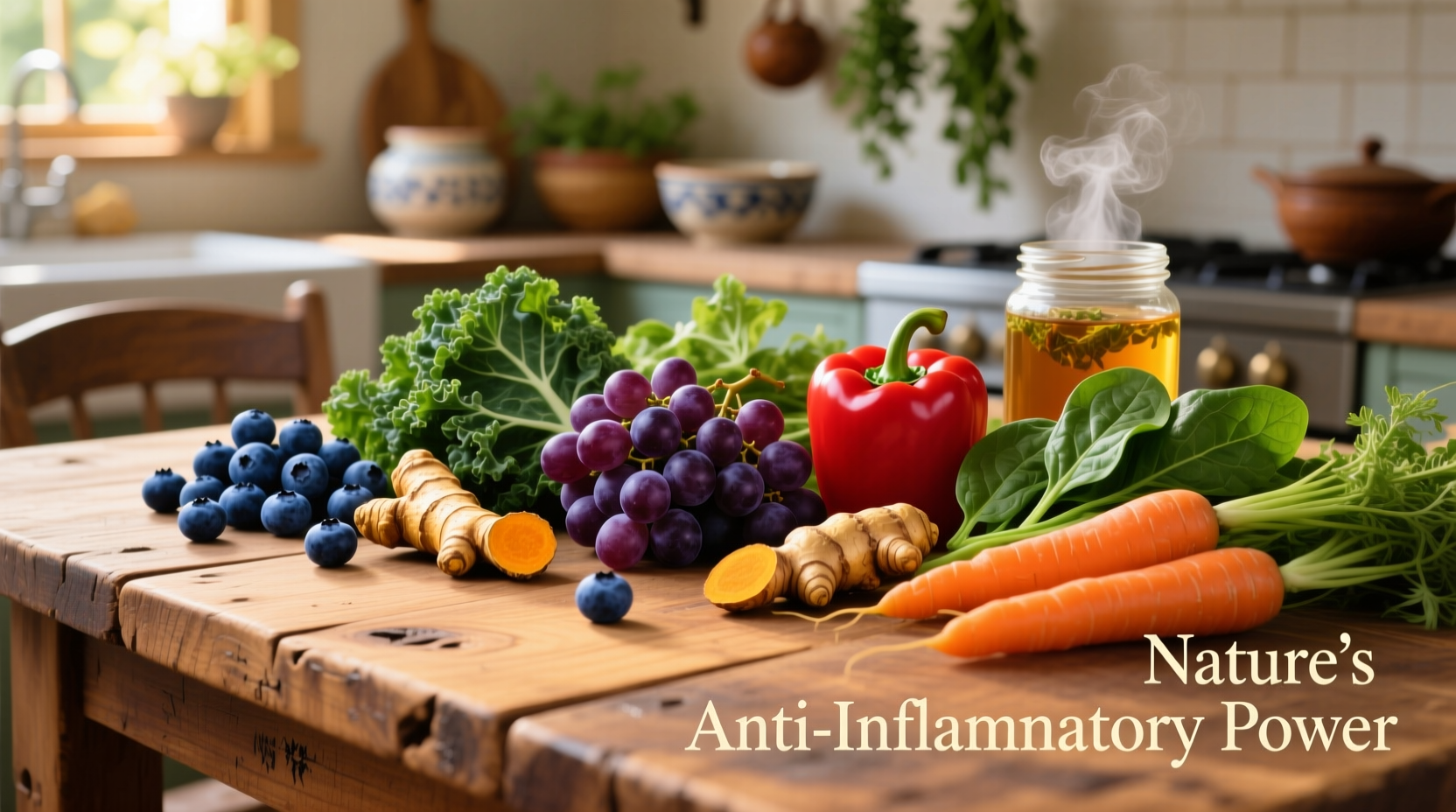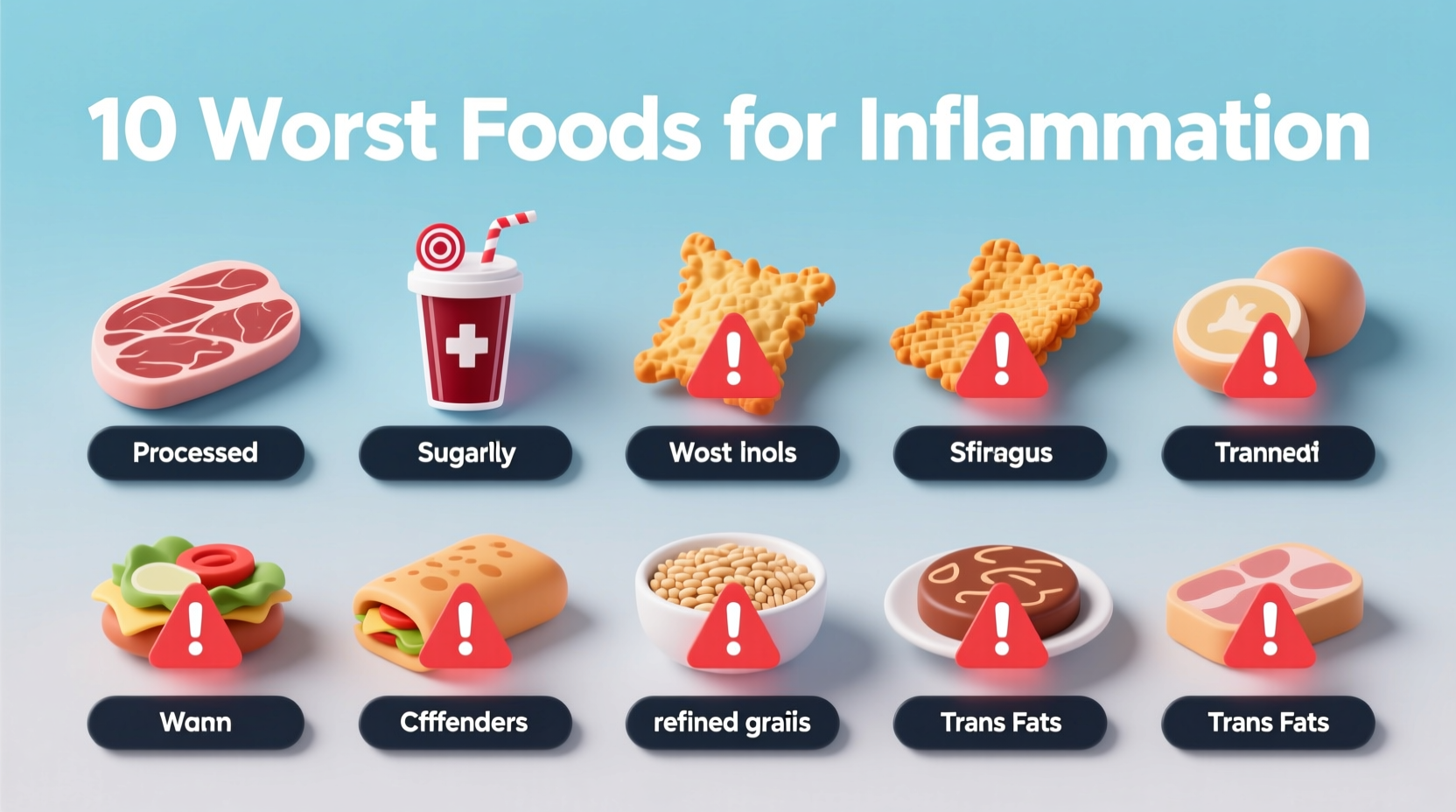Chronic inflammation silently damages your body over time, contributing to heart disease, diabetes, arthritis, and other serious health conditions. Understanding which foods fuel this process is your first step toward taking control of your health. This evidence-based guide reveals exactly which foods to minimize and why they trigger inflammatory responses in your body, backed by the latest nutritional science.
Why Food Choices Matter for Inflammation Control
While acute inflammation helps your body heal from injuries, chronic inflammation creates a dangerous internal environment. Research from the National Institutes of Health shows that dietary patterns significantly influence inflammatory markers like C-reactive protein (CRP) and interleukin-6. The foods you consume daily either calm or ignite your body's inflammatory response through multiple biological pathways.
The Science Behind Food-Induced Inflammation
When you consume inflammatory foods, they trigger complex physiological responses. Sugars and refined carbs cause blood sugar spikes that activate inflammatory cytokines. Unhealthy fats disrupt cell membrane integrity and promote oxidative stress. Processed foods often contain additives that compromise gut barrier function, leading to "leaky gut" and systemic inflammation. Understanding these mechanisms helps you make informed choices that genuinely support your body's healing processes.
Your Complete Guide to the 10 Worst Foods for Inflammation
1. Sugary Beverages and Added Sugars
Sugary drinks like sodas, energy drinks, and sweetened teas deliver concentrated sugar doses that rapidly spike blood glucose. According to research published in the American Journal of Clinical Nutrition, just one can of soda daily increases CRP levels by 87% compared to non-consumption. High-fructose corn syrup particularly damages gut lining and promotes fatty liver disease, both inflammatory conditions.
2. Refined Carbohydrates (White Bread, Pastries, etc.)
Processed grains like white bread, bagels, and pastries behave like sugar in your body. They're stripped of fiber and nutrients during processing, causing rapid blood sugar spikes. A Harvard School of Public Health study found that people consuming the highest amounts of refined carbs had 60% higher levels of inflammatory markers than those eating whole grains.
3. Fried Foods (Especially Deep-Fried)
Frying creates advanced glycation end products (AGEs) that trigger inflammatory responses. Restaurant-fried foods are particularly problematic due to reused oils that form harmful trans fats and aldehydes. The American Heart Association notes that frequent fried food consumption increases heart disease risk by 28% due to inflammatory effects on blood vessels.
4. Processed Meats (Bacon, Sausage, Deli Meats)
These contain sodium nitrite preservatives that transform into inflammatory nitrosamines in your gut. The World Health Organization classifies processed meats as Group 1 carcinogens partly due to their inflammatory properties. Research shows processed meat consumption increases CRP levels by 35% compared to unprocessed meats.
5. Margarine and Hydrogenated Oils
Partially hydrogenated oils contain artificial trans fats that significantly increase inflammation. Though banned in many countries, they still appear in some products. A NIH study found trans fats increase CRP by 73% compared to healthy fats. Even "trans fat-free" products may contain small amounts if serving sizes are manipulated.
6. Excessive Alcohol Consumption
While moderate red wine consumption may have anti-inflammatory benefits, excessive alcohol damages the gut lining and liver, triggering systemic inflammation. More than two drinks daily increases inflammatory markers by 30-50% according to research in the journal Alcoholism: Clinical and Experimental Research.
7. Artificial Sweeteners (Aspartame, Sucralose)
These sugar substitutes may disrupt gut microbiome balance, promoting inflammation. A Nature study demonstrated that artificial sweeteners alter gut bacteria composition, leading to glucose intolerance and inflammatory responses in both mice and humans.
8. Processed Snack Foods (Chips, Crackers, etc.)
Packaged snacks combine multiple inflammatory ingredients: refined carbs, unhealthy fats, and artificial additives. These products often contain high levels of omega-6 fatty acids without balancing omega-3s, creating a pro-inflammatory ratio. Regular consumption correlates with 40% higher inflammatory markers in longitudinal studies.
9. Certain Vegetable Oils High in Omega-6 (Soybean, Corn, Sunflower)
While not inherently bad, excessive consumption of omega-6 rich oils without sufficient omega-3s creates an inflammatory imbalance. The ideal omega-6 to omega-3 ratio is 4:1 or less, but Western diets often reach 15:1. This imbalance promotes production of inflammatory eicosanoids. Choose olive oil or avocado oil instead for cooking.
10. Excessive Red Meat (Especially Conventionally Raised)
While moderate grass-fed beef consumption fits healthy diets, excessive intake—particularly of conventionally raised meat—contributes to inflammation. Heme iron in red meat can promote oxidative stress, and factory-farmed meat often contains inflammatory omega-6 fats. Limit red meat to 1-2 servings weekly for optimal inflammation control.
| Food Category | Primary Inflammatory Mechanism | Key Inflammatory Marker Increase | Better Alternatives |
|---|---|---|---|
| Sugary Beverages | Insulin spikes, AGE formation | CRP +87% | Water, herbal tea, infused water |
| Refined Carbohydrates | Rapid glucose metabolism | CRP +60% | Whole grains, legumes, vegetables |
| Fried Foods | Advanced glycation end products | IL-6 +45% | Baked, steamed, or grilled foods |
| Processed Meats | Nitrosamine formation | CRP +35% | Unprocessed poultry, fish, legumes |
| Hydrogenated Oils | Trans fat incorporation into cells | CRP +73% | Olive oil, avocado oil, coconut oil |
Context Matters: When Inflammatory Foods May Be Less Problematic
Understanding context boundaries helps avoid unnecessary dietary restrictions. Occasional consumption of these foods rarely causes significant harm for healthy individuals. The inflammatory impact depends on:
- Overall dietary pattern: A Mediterranean-style diet rich in anti-inflammatory foods can offset occasional inflammatory food consumption
- Individual health status: Those with autoimmune conditions or metabolic syndrome experience stronger inflammatory responses
- Frequency and quantity: Daily consumption creates cumulative damage while occasional indulgences typically don't
- Food combinations: Pairing inflammatory foods with anti-inflammatory ingredients (like vinegar with fries) can reduce negative effects
Practical Implementation: Reducing Inflammation Through Smart Swaps
You don't need perfection—strategic changes yield significant benefits. Start with these evidence-based approaches:
Smart Grocery Shopping Strategies
Focus on perimeter shopping where whole foods live. Read labels carefully for hidden sugars (appearing as high-fructose corn syrup, maltose, dextrose) and unhealthy fats. Choose products with five or fewer recognizable ingredients. When buying packaged items, check the omega-6 to omega-3 ratio—opt for products with balanced profiles.
Simple Kitchen Swaps You Can Make Today
Replace white bread with sprouted grain options, swap fried potatoes for roasted sweet potatoes, use avocado instead of margarine, and choose grass-fed beef when consuming red meat. For sweet cravings, reach for berries instead of processed sweets—they contain anthocyanins that actually reduce inflammation.
Reading Between the Lines: Decoding Food Labels
"Sugar-free" products often contain inflammatory artificial sweeteners. "All-natural" has no regulatory meaning. "Zero trans fat" can still contain 0.5g per serving. "Gluten-free" doesn't mean anti-inflammatory. Focus on the ingredient list rather than marketing claims to identify truly inflammatory products.

Your Anti-Inflammatory Action Plan
Implement these practical steps to reduce inflammation through diet:
- Eliminate sugary beverages completely—replace with water or herbal tea
- Swap refined grains for whole grains in at least two daily meals
- Replace fried foods with baked or steamed alternatives three times weekly
- Choose processed meat alternatives like mushrooms or lentils for two meals weekly
- Use olive oil instead of vegetable oil for cooking and dressings
- Include three servings of fatty fish or plant-based omega-3 sources weekly
- Fill half your plate with colorful vegetables at every meal
Frequently Asked Questions
How quickly can eliminating inflammatory foods reduce inflammation?
Most people notice reduced joint pain and improved energy within 2-4 weeks of eliminating major inflammatory foods. Blood markers like CRP typically show improvement within 6-8 weeks. Consistency matters more than perfection—focus on making better choices 80% of the time for sustainable results.
Are all fats inflammatory?
No—healthy fats actually reduce inflammation. Monounsaturated fats (olive oil, avocados) and omega-3 fatty acids (fatty fish, walnuts, flaxseeds) have strong anti-inflammatory properties. The problem comes from excessive omega-6 fats without balancing omega-3s, and artificial trans fats found in processed foods.
Can I still eat some inflammatory foods occasionally?
Yes—moderation is key. For most healthy individuals, occasional consumption of inflammatory foods won't cause significant harm. The problem arises from daily, consistent consumption. If you have autoimmune conditions or chronic inflammation, you may need stricter avoidance. Focus on making better choices 80% of the time for sustainable health improvements.
Do cooking methods affect a food's inflammatory properties?
Absolutely. High-heat cooking methods like frying and grilling create advanced glycation end products (AGEs) that trigger inflammation. Steaming, poaching, and baking at lower temperatures preserve food's anti-inflammatory properties. Marinating meats in acidic ingredients like lemon juice or vinegar before cooking can reduce AGE formation by up to 50%.











 浙公网安备
33010002000092号
浙公网安备
33010002000092号 浙B2-20120091-4
浙B2-20120091-4